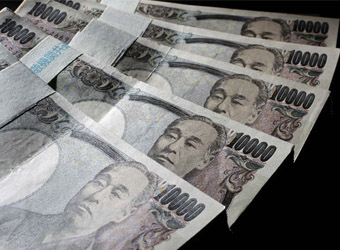The safe-haven yen extended its losses against the dollar and euro on Wednesday as concerns over the standoff between Russia and Ukraine eased somewhat.
Markets will still be keeping a close eye on developments in the region after Russia test-fired an intercontinental ballistic missile from a base not far from the east of Ukraine to a range in Kazakhstan.
But for now, traders are shifting their sights to a raft of data. The greenback strengthened after ADP showed the private sector created only a modest amount of jobs, amid brutal winter weather. The report presaged the more important nonfarm payrolls data in February.
The euro was up 0.2 percent at 141 yen after gaining 0.8 percent on Tuesday, while the dollar was up 0.4 percent over 102 yen after rising 0.8 percent on Tuesday – its biggest one-day gain since mid-January. It was flat against the Swiss franc near 0.89 francs.
“While the market remains vulnerable to the game of brinkmanship between the West and Russia over the situation in Ukraine, it seems that the markets will need a dose of good data to hold up,” said Jeremy Stretch, currency strategist at CIBC World Markets.
Demand for safety faded on Tuesday after Russian President Vladimir Putin played down the prospect of a war in Ukraine, but market players remained on watch.
“I think there’s obviously hesitancy to take bigger positions here,” said Mitul Kotecha, Hong Kong-based head of global foreign exchange strategy for Credit Agricole.
“There is still a wait-and-see attitude. There’s been some relief, but I don’t think the market’s convinced that this is a sustained relief,” he added.
Russian stock markets fell nearly 2 percent on Wednesday, bucking Wall Street’s trend, which also kept alive interest in safe-haven currencies.
Euro choppy before ECB
The euro eased 0.2 percent to near $1.37, having retreated from Friday’s two-month high around $1.3825. Investors preferred to stay away from the euro given the risk that the European Central Bank could loosen monetary policy at Thursday’s review.
With inflation running well below the ECB’s target of just under 2 percent, the central bank is under pressure to do more to drag inflation out of a “danger zone” that threatens to stagnate the region’s fragile recovery.
|
|
Price |
|
Change |
%Change |
|
=USD |
80.10 |
|
-0.03 |
-0.04% |
|
EUR/USD |
1.3735 |
|
-0.0007 |
-0.05% |
|
AUD/USD |
0.8985 |
|
0.0036 |
0.40% |
|
JPY/USD |
0.9767 |
|
-0.0016 |
-0.16% |
|
CHFUSD |
1.1266 |
— |
UNCH |
0% |
|
GBP/USD |
1.6736 |
|
0.0074 |
0.44% |
On Wednesday, investors will eye January retail sales and services sector surveys, but CIBC’s Stretch added that any move above $1.37 by the would be sold.
“I do not think the market has priced in the risk of ECB action fully,” he added.
Indeed, overnight euro/dollar implied volatility, a gauge of how sharp currency swings will be, jumped to 11.50 percent from around 5 percent at the start of the week.
The start of China’s annual parliament meeting offered no major surprises, and major currencies showed little reaction.
China announced on Wednesday it would maintain its economic growth target for 2014 at about 7.5 percent signalling that its policy focus would be slanted in favor of reforms and re-balancing the economy.
Source: Reuters



